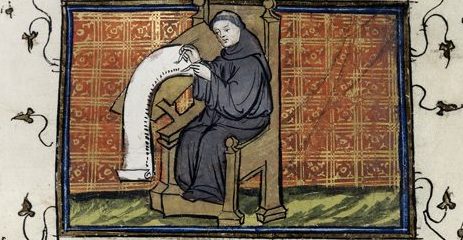(detail from British Library, Royal 17 E III, f. 145)
This online concordance groups the words Chaucer used by dictionary headword (in this case, the headwords in the Middle English Dictionary [MED]). Thus, all the many forms of the verb ‘to be’ [ben, for Chaucer], ‘am’, ‘art’, ‘is’, ‘beth’, ‘was’, ‘weren’ (to name just a few), are gathered under a single entry. It is a ‘glossarial concordance’, then, because it is organized, not by spelling, but by the ‘glossary’ represented by the MED. Such a concordance has a variety of scholarly uses but it can help any reader of Chaucer investigate his writings by keyword–always useful in a writer like Chaucer who made so many words rich with complexity and invented many more. These key words often lead directly to key ideas.
This concordance also allows for searches by the particular spelling of a word (that is, to look for every occurrence of a word in that spelling) as well as by a word’s part of speech (that is, you can search for all of the places a certain verb in the 2nd person appears, or the plural of a given noun you can use the relevant search boxes to gather together every example). Each search box auto-fills predictively to help you both explore and then narrow possibilities. The auto-fill function in the broadest search (for the glossarial form) provides you with ready access to MED definitions, making it easy to find the range of meanings of a given word quickly.
The Glossarial Concordance was Larry Benson’s masterwork — a project over 20 years in the making. It began with the digital form of the Riverside Chaucer (in 1987, when the Riverside was published, this was an unexpected and wholly new resource), and then, in what was a monumental labor, Benson ‘tagged’ every word of that edition grammatically and then ‘lemmatized’ them, so that each and every form of every word in Chaucer was matched to the relevant MED entry. Benson then extended that tagging and lemmatization to all of the words in Gower’s Confessio Amantis. The concordance also allows you to search for all of these word forms in all of Chaucer and Gower, in one of these poets alone, or individual works and parts of works.

